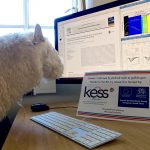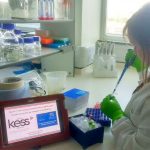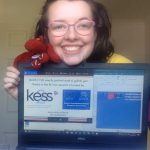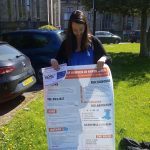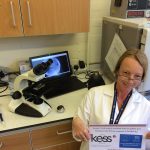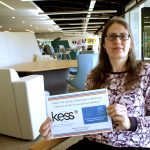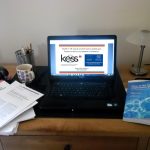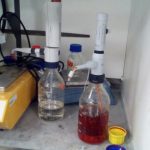
Funding from the European Social Fund (ESF), accessed through KESS 2, enables students to undertake higher-level research study in Wales across a variety of projects in collaboration with company partners. On 9th May 2017, our KESS 2 students celebrated Europe Day by sharing with us a #EuropeDaySelfie and told us a little bit more about how EU funds have benefited their research…
Anne Collis
School of Social Science, Bangor University
Company Partner: Barod
“The European funding has made it possible for Bangor University, Barod and me to co-design and co-develop research. Our research into better ways to consult members of the public about public policy and services is already having a real-world impact. I’ve learned to turn ideas into research. Barod has gained confidence and skills to become a partner on other research projects. And bringing Barod’s experience into the University is benefiting the University too.”
Pip Jones
School of Environment, Natural Resources & Geography (SENRGy), Bangor University
Company Partner: The Woodland Trust in Wales
Across Welsh hills and valleys, nearly 10 million sheep and lambs are munching grass in the sunshine. But farming, a major contributor to the Welsh economy, is vulnerable. Extreme weather, such as the spring snow of 2013, can devastate flocks and farm businesses. EU funding enables Pip Jones and her trusty ‘electric sheep’ to investigate how to optimise farm landscapes to enhance resilience to adverse weather. This could increase efficiency, animal health, and productivity. Today, Melyn the sheep is hard at work in the office, reviewing her paper about how tree shelter can reduce the chilling effect of wind.
Alex McCubbin
Organisms and Environment Division, Cardiff University
Company Partner: EcoExplore
“My research investigates the possible underlying evolutionary relationship between mate choice and maximisation of offspring fitness in storm petrels. Funding supplied by the EU (via KESS 2) covers a PhD stipend and all necessary costs involved with the project, allowing me to carry out molecular based research. Without the EU and KESS 2, this project and my research would not be possible.”
Rhiannon Chalmers-Brown
Sustainable Environment Research Centre (SERC), University of South Wales
Company partner: Tata Steel Port Talbot.
“Without EU funds I wouldn’t be doing a PhD at all! My PhD and the technology and research that will follow is incredibly important for the future of sustainable industry. Because of EU funding I’ll be able to have a huge impact on the way industry operates and how it affects the environment, leading to advancements in our bioeconomy and securing a future for businesses as well as saving the planet.”
Lorna Drake
Organisms and Environment Division, Cardiff University
Company Partner: The Wildlife Trust of South and West Wales
“My research investigates Eurasian Otter diet and how it varies over different time and spatial scales. EU funding, via the KESS 2 scheme, is allowing me to carry out molecular studies into otter diet, increasing clarity about the foraging ecology of Eurasian otters, a European Protected Species. This will help conservation of otters by showing how they may be acquiring parasites and contaminants, how predation may cause conflicts between otters and fisheries and if predation by otters is impacting other species of conservation concern. ”
Lewis Thomas
Aberystwyth Business School, Aberystwyth University
Company Partner: Llangollen International Musical Eisteddfod
“My research title is ‘Cultural Value of the International Eisteddfod and understanding its digital audience’. The EU funding has helped my project by giving a generous stipend and budgets for travel and equipment for research software used for high standards of analysis along with the continued support towards my research project. The project gives a perfect platform to transition ideas into research, which will contribute to the knowledge of understanding cultural value. The International Eisteddfod benefits massively from Europe due to its vast amount of competitors and spectators attending from overseas whilst promoting their own international peace message through music. This project would not be possible without the assistance of the EU funding!”
Perminder Sangha
College of Engineering, Cardiff University
Company Partner: Haydale Ltd
“I am currently undertaking my PhD project at Cardiff University in conjunction with Haydale Ltd, researching how the use of plasma functionalisation techniques have an effect on the electrical and mechanical properties of carbon nanomaterials. My project is EU funded and has allowed me to further develop my knowledge in a subject area I am interested in as well as exposing me to a professional research environment, where I am collaborating with experts in the field on real problems.”
Nicole Hughes
School of Social Sciences, Bangor University
Company Partner: St. David’s Hospice
“These funds have enabled me to be a part of a worthwhile project which looks at the Social Value of Hospice across North Wales. Within the U.K., over a quarter of a million people currently receive care from hospices either within Hospice care facilities or within their own homes. However in a difficult financial climate and with only 20% NHS funding, independent Hospices need to reaffirm their impact and contribution to society.
This project not only benefits me but also the four hospices I am working with St. David’s hospice, Nightingale house, St Kentigern and Hospice at home Gwynedd and Anglesey. I am only 1 year into this PhD and already I have been a part of so many amazing opportunities, some of which include attending conferences, presenting posters, publishing an abstract and interviewing staff at the hospices who have so much passion for the work that they do.”
Fiona Tyson
Aberystwyth University
Company partner: Techion UK
“EU funds are helping me investigate drug resistance in horse parasites, to help safeguard the future of our furry friends! Thank you KESS2 and Techion.”
Jennifer Bridle
Cardiff University
Company Partner: Orangebox
“I am currently researching workspace use, wellbeing, productivity and happiness. The project is made possible by funding provided by KESS 2. It is being conducted with Orangebox, an innovative office furniture design and manufacturing company. In recent years, various factors such as changes in technology and an increase in flexible working practices, have led to changes in how offices are designed. The funding will allow us to investigate new ways of working, modern office design, and psychological wellbeing.”
Jody Leigh Edmunds
School of Biosciences, Cardiff University
Company Partner: The Lleyn Sheep Society
“My KESS 2 project is looking at genome wide associations in Lleyn Sheep with a focus on maternal ability. This project is in collaboration with a company partner, The Lleyn Sheep Society and allows me engagement with animal breeders, academics and the public. I am extremely grateful to the EU for funding this KESS 2 project and my research would not be possible without it.”
Dawn Cavanagh
Faculty of Life Sciences and Education, Glyntaff USW
Company Partner: Mencap
“I simply couldn’t pursue a PhD without EU funding. My PhD, and the research that will follow, is incredibly important to the lives of people with learning disabilities. People with learning disabilities experience significant health inequalities compared with their peers in the general population. Due to EU funding this research will explore the experiences of people with learning disabilities who have had an annual health check; in particular, how any health needs identified during the health check are followed-up and self-managed. This may lead to improved health outcomes for people with learning disabilities!”
- Anne Collis
- Pip Jones
- Alex McCubbin
- Rhiannon Chalmers-Brown
- Lorna Drake
- Lewis Thomas
- Perminder Sangha
- Nicole Hughes
- Fiona Tyson
- Jennifer Bridle
- Jody Leigh Edmunds
- Angela Oliveria


